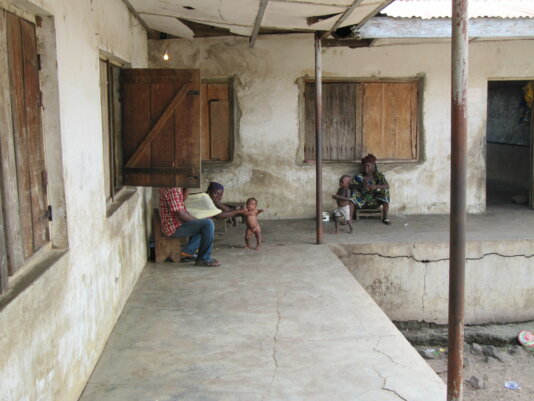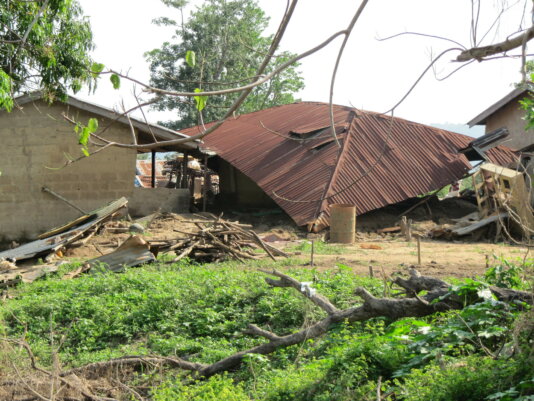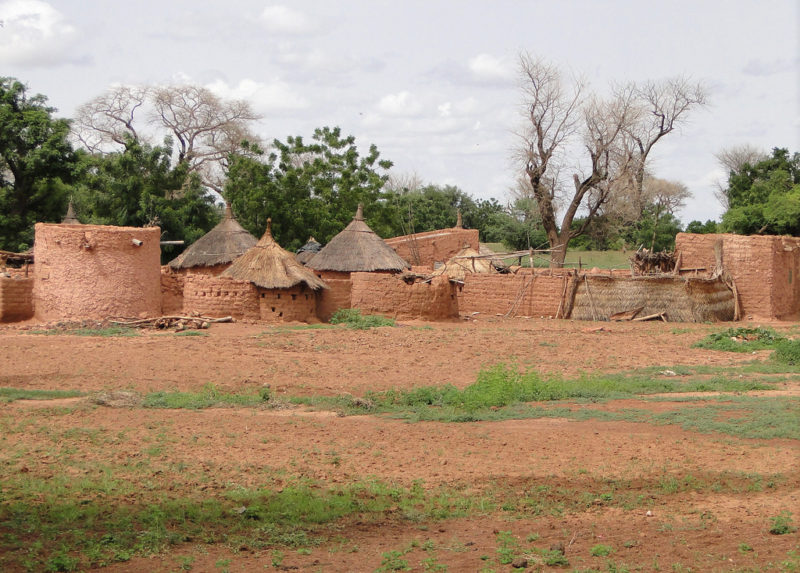- About
- Topics
- Picks
- Audio
- Story
- In-Depth
- Opinion
- News
- Donate
- Signup for our newsletterOur Editors' Best Picks.Send
Read, Debate: Engage.
| December 24, 2021 | |
|---|---|
| topic: | Natural disaster |
| tags: | #Africa, #climate change, #climate action, #floods |
| located: | Nigeria |
| by: | Ekpali Saint |
Batholomew Offor still remembers the day heavy flood hit his community in Aponmu, a city in the southwestern region of Ondo in Nigeria, and destroyed the small factory where he processes garri - granular flour produced from cassava - and palm oil.
“It was in 4 September. The flood destroyed my house and factory,” 56-year-old Offor told FairPlanet. “I have not felt this bad before. The flood carried away four of the drums I use in processing palm oil in my factory. One drum costs N120, 000 ($292.58). Now, it is difficult to begin work.”
Every year, flooding occurs in Nigeria and affects mostly states where the Niger and Benue rivers converge. Farmlands and houses in these states are often submerged following heavy rainfall, which threatens people’s means of livelihood.
Globally, flood accounts for about 47 percent of all weather-related disasters. Between 1998 and 2017 alone, floods affected more than 2 billion people worldwide, according to World Health Organization.
In Nigeria, where Offor is based, thousands of people, especially those living in riverine areas, are affected by flooding each year. In July 2012, Nigeria witnessed the worst flooding in more than 40 years. The 2012 floods, which affected 27 out of the country’s 36 states and the capital, killed 363 people and displaced two million Nigerians, according to the National Emergency Management Agency (NEMA).
That same year, hundreds of thousands of acres of land were flooded when the rivers Niger and Benue “over-spilled.”
In 2015, statistics showed that more than 100,000 were displaced, with 53 deaths recorded. In 2016, 92,000 were displaced and 38 died and in 2017, floods affected 250,000 people in the country’s eastern-central region.
In 2018, more than 1.9 million persons were affected by floods across 12 states in Nigeria and thousands displaced from their homes. In 2019, more than 200,000 people were affected by floods with 158 deaths recorded.
As for 2020, data from NEMA showed that at least 69 people lost their lives in flood disasters.
This April, in Nigeria’s Ondo state, where Offor has a factory, over 40 houses were destroyed at Igisogba community. In Nigeria’s Adamawa state, flooding that began in early August affected over 100,000 people, according to the United Nations Office for the Coordination of Humanitarian Affairs (UN OCHA).
In Aponmu, Kehinde Olamiti, who is a cocoa farmer, said she had to move away to another community in Idanre - one hour drive from Aponmu - after the rain destroyed her house. She added that since her husband passed away, she has been training her three children alone. But losing everything to the flood disaster discourages her.
“I moved to Idanre with my children because nowhere to stay. I rented one room to manage with my children in Idanre,” 58-year-old Olamiti, whose husband passed on four years ago, told FairPlanet. “The impact of the flood is too much for me. The money we are now spending is too much. Going to Aponmu from Idanre is expensive. But I must go there [Aponmu] because my children are schooling there.”
Several causative factors lead to flooding in Nigeria each year. For example, data from the Nigerian Meteorological Agency gathered between 1981 and 2017 showed that annual rainfall contributes significantly to flooding.
“Extreme rainfall is one of the major causes of flooding,” Taiwo Ogunwumi, an environmental risk researcher, told FairPlanet. “When it is beyond what the soil can absorb, it leads to an overflow.”
According to him, there are other factors beyond nature, such as technical and policy ones, that lead to flooding. "Blockage of drainage is a [technical] cause of flooding. It is either [because] some places lack good drainage system or some have been blocked.” He adds that policy factors include existing institutional policies that tackle improper waste disposals.
However, experts also point out that the resultant effect of climate change aggravates flooding in Nigeria and increases environmental problems in the country. According to a World Bank environment expert, Nigeria needs $140 billion to fight climate change. This means that without adequate funding and action, an increase in climatic events may further threaten the means of livelihoods in Nigeria.
However, money made available to fight environmental problems such as floods is sometimes diverted. In 2016, for example, an investigation carried out by the International Centre for Investigative Reporting (ICIR) revealed how state governments “squander” Ecological Funds meant to fight environmental problems, including floods, in affected communities. This often shatters the hope of victims expecting respite from the government.
“The government has not done anything since the flood incident,” Offor said. “After the incident, the Councilor visited our community once to get the names of those affected. Since then, we have not heard anything.”
Sunday Abiola, 58, is tired of waiting for the government’s support. Since he is unable to repair his house due to meager financial resources, he has decided to rent an apartment where his family can stay.
“What happened is paining me. I am always comfortable in my house, but where I am now, I am not comfortable,” the father of four said. “I am the owner of the house the flood destroyed. But now, I have suddenly become a tenant.”
Before a flood disaster hits any community in Nigeria, there are agencies that alert the country through their seasonal rainfall prediction. For instance, the Nigeria Hydrological Services Agency (NIHSA) had predicted in its 2021 flood outlook presentation that 28 out of the country’s 36 states “would most likely experience flooding this year.”
Despite the early warning, floods still hit several communities, leaving many Nigerians displaced; partly because “state governments do not show commensurate response to mitigate floods in their domains,” said Clement Nze, the Director-General of NIHSA.
But without financial commitment from state governments, tackling disasters such as floods would be difficult. For this, the Nigeria Meteorological Agency (NiMet), in August, called on states and local governments to allocate one percent of their annual budgets to “enhance the development of early-warning tools for disaster risk reduction across the country.”
According Ogunwumi, however, early warning alerts do not make it to rural areas. He stressed that state governments should involve relevant agencies and community leaders “to come together to develop a structural and effective flood risk management strategy that can be adaptable to each of the state.”
With an effective warning system and proper awareness of flooding to flood-prone areas, people like Offor will be able to take the right steps to reduce the impact of flood.
“Honestly, it has not been easy for me. I can’t meet up with my daily expenses. The expenses to repair what was damaged are much,” the father-of-two said. “Thank God I paid my children’s school fees before the incident. If not, they would have stayed back because no money. If they had not resumed before the incident, it means I won’t be able to pay their school fees.”
Image by EC/ECHO/Nicolas Le Guen.
By copying the embed code below, you agree to adhere to our republishing guidelines.


